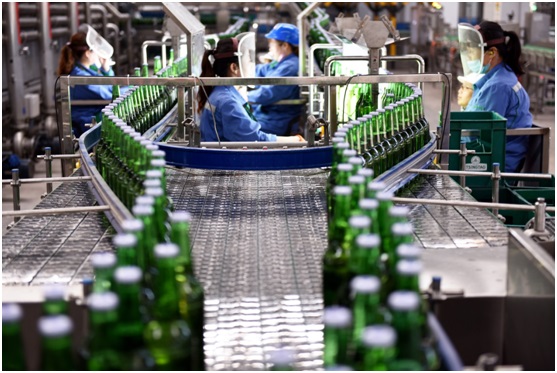By Lu Ya’nan, People’s Daily
The novel coronavirus outbreak will result in temporary economic setback, but it will not change China’s positive economic fundamentals and the long-term trend, the country’s top economic regulator said on Monday.
China’s GDP fell by 6.8 percent in the January-March quarter, with major macroeconomic indicators contracting. “We have the confidence, conditions and capabilities to accelerate the push for a return to the pre-crisis economic level and achieve the annual growth goal for economic and social development,” said Yan Pengcheng, director of the Department of National Economy at the National Development and Reform Commission (NDRC), explaining the country will rely on its strong domestic market, hedge against risks with macro policies, straighten economic circulation and give play to the roles of market entities.
Economic operation amid COVID-19 isn’t comparable to that under normal orders. Yan believes that the performance of the Q1 economy shall be evaluated under the greater background to which the pandemic has brought huge impacts.
Objectively speaking, China has adopted higher-than-standard containment measures in a prompt and decisive manner since the onset of the COVID-19 epidemic, which not only curbed the spread of the virus in a very short period of time, but also secured the basic life for 1.4 billion people and maintained social order.
“We have to make sacrifice to contain the disease, as life is priceless. The short-term economic pressure is worth it and something we must bear because the lives and health of the people are more important,” Yan explained.
China’s economy is recovering in an orderly manner. Since March, economic indicators of the country have started picking up, and the country’s domestic demand was also bouncing back. The decrease of investment and consumption in the first quarter reduced by 8.4 and 1.5 percentage points respectively than that in the first two months. Both the purchasing managers index (PMI) and non-manufacturing PMI of the country rose above the 50-point mark indicating economic expansion. In the first half of April, the country’s power generation capacity expanded by 1.2 percent from a year ago, indicating positive growth.
To stabilize the economic fundamentals and safeguard the bottom line of livelihood, China will issue a package of macro policies that cover the following five major aspects.
Regarding the difficulties obstructing production resumption, China will accelerate the eradication of improper regulations and unreasonable rules. It will support micro- and small-enterprises, as well as individual businesses to restore operation, so as to drive the work resumption of upper- and lower-stream industries, and enterprises of different sizes.
The country will also adopt more constructive fiscal policies and more flexible monetary policies to mitigate the impacts from the pandemic, in case the short-term influence turns into a lasting trend. China will improve its deficit ratio, issue special bonds and largely expand the issuance of local government special bonds.
The country will stabilize traditionally major consumption, such as automobiles and home appliances. Besides, it will appropriately enhance public consumption, foster new growth points, drive online consumption and spur in-store performance. To expand effective investment, the country will focus on the areas of weakness, especially those exposed amid the COVID-19 pandemic.
While accelerating the implementation of existing policies to aid enterprises, the country will further study and issue relevant supportive measures, doing all it can to stabilize enterprises, especially small- and medium-sized ones. It will make all-out efforts to help foreign trade enterprises resume production, keep international logistics channel unimpeded, and help enterprises secure orders, markets and shares.
Besides, the country will lay huge attention on major workforce groups such as college graduates, migrant workers, and laborers from impoverished regions to enhance employment stability. Meanwhile, it will offer basic living allowance, relief and support, as well as temporary shelters for those in dire poverty.
According to Yan, China’s CPI in March shrank by 1.2 percent from a month ago, the largest month-to-month decrease in the recent 10 years or so, which indicated the rapidly alleviated impacts from the COVID-19 pandemic on major farm produce and other commodities. As the Chinese society and production take further steps toward recovery, continuous CPI declines are expected.
The NDRC will keep supporting the work resumption of the hog industry, encourage the production expansion of poultry, meat and aquatic products, and enhance the management of spring ploughing. Cold-chain logistics will also be developed to lower transportation cost and relevant expenses in transaction. In addition, China will monitor and guide local departments to expand temporary subsidies and deliver the money to those in need in a timely manner.
Employees work on a production line in Tsingtao Brewery (Zhangjiakou) Co., Ltd. in Xuanhua economic development zone, north China’s Hebei province, April 18, 2020. Photo by Chen Xiaodong, People’s Daily Online










Leave a Comment